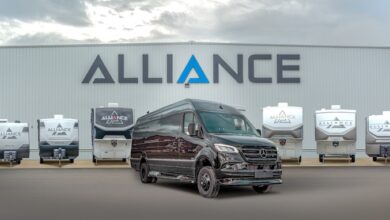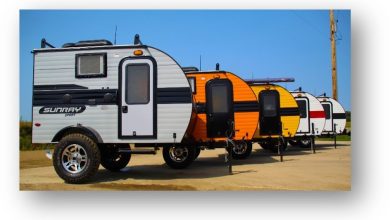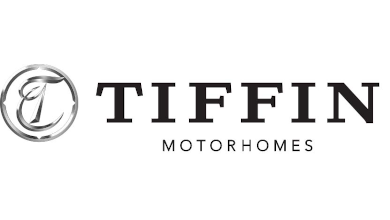Specialty Vehicles and RVs Provide Invaluable Service During COVID-19 Pandemic
As hospitals and medical centers continue to use mobile medical vehicles to provide frontline support, many other service applications are popping up across the country using specialty vehicles like food trucks, school buses and RVs. Whether it’s using RVs to quarantine essential workers or leveraging vehicles to increase mobile testing locations, society is rethinking how we provide essential services on the road.
Mobile Testing Sites
One of the most obvious uses for specialty vehicles is COVID-19 mobile testing sites. Already upfitted for medical services, these vehicles are being used across the country to assist with the testing effort. For example, Charlotte, N.C.-based Atrium Health and Novant Health recently opened mobile COVID-19 testing sites on Charlotte’s east and west sides to expand testing in “hot spots” where minority communities are disproportionately affected by the virus.
Utah’s Intermountain Healthcare dispatched a mobile COVID-19 testing unit to Orem and Provo to combat the spread of the virus. And Trinity Health of New England/St. Francis Hospital in Connecticut has partnered with Malta House of Care Mobile Medical Clinic to provide mobile testing operations. Malta provided their most recently retired mobile clinic, a 40-foot Winnebago, as a base of operations for Trinity’s drive-through coronavirus testing clinic on the Saint Francis Hospital campus.
Even autonomous specialty vehicles are joining the fight. The Mayo Clinic is using autonomous vehicles in Jacksonville, Fla., to transport test results to a nearby lab. The use of artificial intelligence protects the staff from exposure to the virus by using cutting-edge autonomous vehicle technology, as well as frees up staff time that can be dedicated to direct treatment and care for patients.
Medical Services Unrelated to COVID-19
While hospitals and ERs are overcrowding, there are still people around the country that need non-corona related health services but may be avoiding health care centers for fear of being exposed to the virus. Sometimes, bringing these services straight to the patients is the best way to ensure patients get the care that they need.
For instance, Detroit’s Henry Ford Health System has deployed its mobile medical unit for newborn follow-up appointments amid the COVID-19 pandemic. Parked outside of the Henry Ford Corporate offices, the 39-foot bus sees newborn patients seven days a week. The vehicles feature two exam rooms, a bathroom, and a waiting area. During the appointments, a pediatrician will check the infant’s weight, conduct a physical exam, provide counseling, and check bilirubin levels, if needed.
In Oklahoma City, Dispatch Health is delivering medical care services to the homes of all Blue Cross and Blue Shield of Oklahoma members. Though they are not testing or treating COVID-19, they still assess and address issues like asthma, minor orthopedic injuries, IV fluids and medications, simple wound repairs, and more.
Seattle is also delivering primary medical care for acute and chronic conditions directly to those who need it. The King County mobile medical program is bringing its mobile medical units directly to homeless areas in the region. Built on Winnebago Specialty Vehicle Commercial shells, the two units give homeless individuals access to a physician, nurse, mental health case manager, and a chemical dependency professional, as well as a dental group.
Command Centers
In the past, during times of disaster, state and local agencies have used RVs to serve as local command centers, portable offices, and even temporary housing. As COVID-19 began to spread, Cruise America began renting about 100 RVs from its fleet for commercial use. The report notes that a large number of these units are being used for government entities, businesses, and medical centers, including the Mayo Clinic, as command centers during this unprecedented time.
Amid a global health crisis, operation centers play a vital role in emergency command communications. Fire and emergency medical services (EMS) protect public health at all costs. Even with social distancing guidelines in place, command centers must have a staff to field calls. Many states have turned to deploy mobile communication centers to keep to social distancing guidelines, as well as ensure they can handle any requests.
Quarantine Living Quarters
Beyond upfitted specialty vehicles, RVs are also playing a pivotal role in the coronavirus response. Usually used by vacationers on the road, RVs are now serving as living quarters for doctors and other essential workers who do not want to expose anyone to the virus.
For example, a Dallas-area woman launched a creative idea for keeping her physician husband quarantined from their family when he is off duty during the COVID-19. The approach seeks to match medical personnel with people willing to donate an RV or camper for similar uses. This group, RVs for MDs, has grown to over 20,000 members in a matter of weeks and is matching RV owners with frontline healthcare and other emergency response workers every day.
In Los Angeles, fleets of motorhomes are providing the homeless populations with quarantine quarters safely isolated from the public, and other California cities are following suit.
Also, RV dealers across the nation are getting calls from governments, utilities, and even individuals who need mobile housing units to sequester people like doctors, nurses, and utility workers.
Community Outreach Services
During these uncertain times, community service remains an integral part of our society. From food trucks to school buses, many organizations and communities are using their specialty vehicles to serve others.
In Minnesota, The Vikings have repurposed their Viking’s Table Food Truck built from a Winnebago commercial shell to provide food to those in need in the wake of COVID-19. Originally designed to serve summertime meals to kids and work at events like home football games and city festivals, the Viking’s Table quickly pivoted to a pre-packaged meal delivery system during the pandemic. The truck staff is preparing meals to deliver to a nearby nonprofit pantry for distribution to area residents in need.
And while many students are homeschooling during the pandemic, some children in underprivileged areas have no internet access. Some school districts are now utilizing school buses to help. In Alabama, the Hoover School District has deployed eight Wi-Fi equipped school busses to support their students now learning from home. These busses are parked in the neighborhoods where kids need it the most and act as a mobile hotspot. School districts in Austin, Texas, and Pine Bluff, Ark., have deployed mobile hotspots, as well.
The virus has also disrupted the justice system, and cities are starting to get creative with specialty vehicles in response. In Salt Lake City, mobile Courtroom 6 is parked outside of the courthouse curb and allows defendants to remain a safe six-foot distance from a judge and judicial assistant inside the mobile courtroom. At the same time, a prosecutor appears over a laptop video and a defense attorney tunes in by phone.
As local governments and businesses look to reopen as the recovery begins, social distancing guidelines are expected to remain in effect at some level until antibody testing and/or a vaccine are widely available. Until then, we can expect to see more organizations leveraging the flexibility and maneuverability of RVs and specialty vehicles to help fill in the gap of services coronavirus has required. The open canvases these vehicles provide translates into nearly endless options for communities to continue to deliver the services their citizens need.



